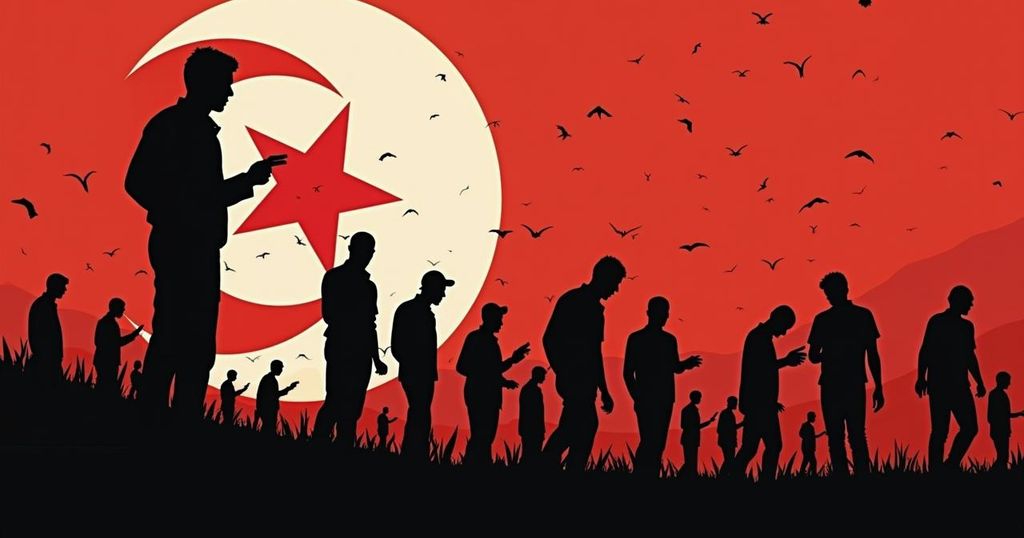Concerns of Repression Following Saied’s Election Victory in Tunisia
In Tunisia’s recent presidential election, Kais Saied allegedly secured 90.7 percent of the votes amidst a voter turnout of only 28.8 percent. The electoral atmosphere raised concerns regarding repression, with accusations of undermined judicial integrity and exclusion of opposition. The outcome may solidify Saied’s authoritarian tendencies, prompting scrutiny from international observers, particularly concerning human rights and migration issues.
In the recent presidential election in Tunisia, incumbent President Kais Saied has reportedly won 90.7 percent of the votes according to preliminary results, albeit with an alarmingly low voter turnout of only 28.8 percent. This stark contrast highlights the profound divisions within the North African nation. Despite the substantial vote percentage, the electoral environment has been marred by a lack of competition and claims of manipulation, prompting widespread concern over the democratic integrity of the process. Many critics assert that Saied has systematically marginalized potential challengers, leading to significant public protests prior to the election. Demonstrators have accused the president of oppressing civil society and curbing freedoms, further exacerbating feelings of discontent among the populace. Responding to his supposed victory, Saied indicated in a national address that he would continue his agenda against corruption, pledging to purge his administration of perceived enemies. However, these comments have raised alarms among human rights advocates, who fear that his rhetoric may incite further repression against dissent. Throughout the electoral process, there were numerous allegations of vote rigging, as many qualified candidates were either excluded from running or faced imprisonment. Of the 17 candidates who sought to compete, only three were permitted, with serious doubts raised about the fairness of the electoral commission’s decisions. The low turnout can be partly attributed to a fractured opposition, leading to an environment where Saied could galvanize his support base, notably among those reliant on state apparatuses. Despite the evident public dissatisfaction, fears are that Saied’s victory will embolden an already repressive regime, chipping away further at the democratic foundations established post-2011 uprising. Internationally, the reaction from the European Union has largely been muted. Given the focus on migration control, many fear that the EU will overlook human rights abuses as the Tunisian government continues to aggressively intercept irregular migrants attempting to reach Europe. This dependence raises troubling questions about the future of democracy in Tunisia. As the political landscape continues to evolve, many observers worry that Saied, powered by this electoral outcome, will persist in his repressive strategies against opposition voices, leading to an increasingly authoritarian governance model in Tunisia.
The article discusses the recent presidential election in Tunisia, in which Kais Saied, the incumbent president, claimed a significant electoral victory amid a dishearteningly low voter turnout. Reports indicate that Saied received 90.7 percent of the vote with a mere 28.8 percent turnout, drawing attention to stark divisions in the country. The election environment was rife with accusations of judicial interference and the stifling of opposition, prompting concerns regarding the health of democracy in Tunisia. Many prominent political figures faced exclusion from the race, either through imprisonment or disqualification, with civil rights advocates lamenting the state of political freedoms in the country. The international implications of this electoral outcome also raise critical questions, particularly in the context of migration policies that have tied EU support to Tunisia’s handling of irregular migration.
In summary, Kais Saied’s anticipated victory in Tunisia’s presidential election, characterized by a low voter turnout and significant controversy surrounding electoral legitimacy, raises profound concerns regarding the future of democracy and civil liberties in the nation. The exclusion of meaningful opposition and recent repressive measures signal a troubling trajectory for governance. Consequently, the international community may face a dilemma, as the prioritization of migration control appears to overshadow concerns about human rights and the democratic process domestically. As Saied embarks on his renewed mandate, fears persist that his rule will increasingly lean towards repression rather than reform.
Original Source: www.aljazeera.com




Post Comment